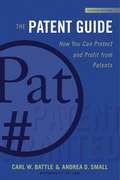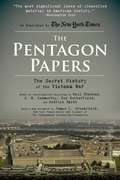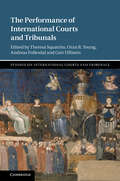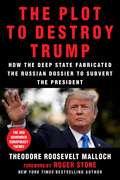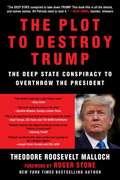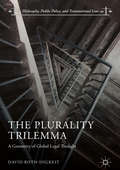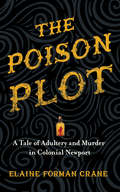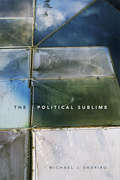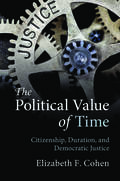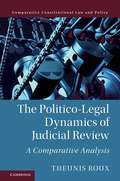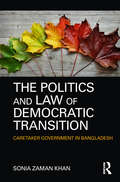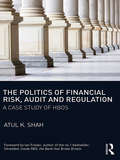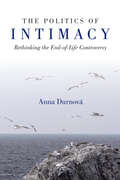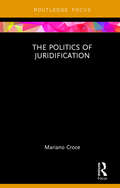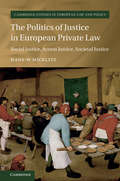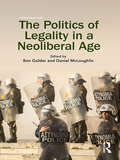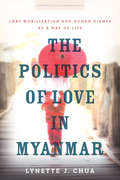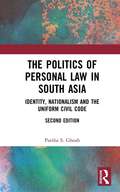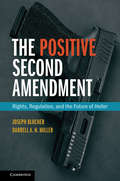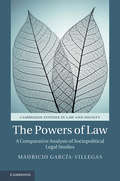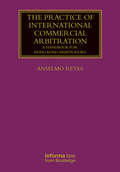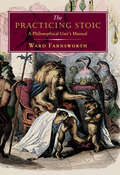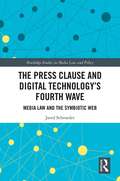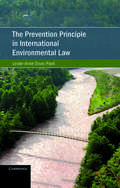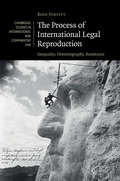- Table View
- List View
The Patent Guide: How You Can Protect and Profit from Patents (Second Edition) (Allworth Intellectual Property Made Easy)
by Carl W. Battle Andrea D. Small"Recommended." —Library Journal Coming up with a million-dollar idea is only the first step in what might seem like a long and difficult process. In The Patent Guide, Second Edition, experienced patent attorneys Carl W. Battle and Andrea D. Small deliver basic and comprehensive advice that is easy to understand and will allow you to protect, promote, and profit from your ideas. Chapters discuss such topics as: How to commercialize your invention Where to find sources of information and assistance What guidelines you should follow when obtaining a patent How to obtain foreign patent rights How to maintain confidentiality of your ideas When to use patent attorneys and agents How to deal with invention brokers and promotion firms How to enforce your patent against infringement Fully updated and revised, this new edition includes information on inventor notebooks and records, updates to the patent filing process in the United States and abroad, the latest USPTO forms and templates, and changes to electronic filing and submission procedures. With easy-to-use forms and step-by-step instructions, The Patent Guide is an indispensable tool to help minimize costs and maximize profits of your ideas and inventions.
The Pentagon Papers: The Secret History of the Vietnam War
by Neil Sheehan Fox Butterfield Hedrick Smith E. W. Kenworthy James L. Greenfield“The WikiLeaks of its day” (Time) is as relevant as ever to present-day American politics.“The most significant leaks of classified material in American history.” –The Washington PostNot Fake News! The basis for the 2018 film The Post by Academy Award-winning director Steven Spielberg, The Pentagon Papers are a series of articles, documents, and studies examining the Johnson Administration’s lies to the public about the extent of US involvement in the Vietnam War, bringing to light shocking conclusions about America’s true role in the conflict.Published by The New York Times in 1971, The Pentagon Papers riveted an already deeply divided nation with startling and disturbing revelations about the United States' involvement in Vietnam. The Washington Post called them “the most significant leaks of classified material in American history” and they remain relevant today as a reminder of the importance of a free press and First Amendment rights. The Pentagon Papers demonstrated that the government had systematically lied to both the public and to Congress.This incomparable, 848-page volume includes:The Truman and Eisenhower Years: 1945-1960 by Fox ButterfieldOrigins of the Insurgency in South Vietnam by Fox ButterfieldThe Kennedy Years: 1961-1963 by Hedrick SmithThe Overthrow of Ngo Dinh Diem: May-November, 1963 by Hedrick SmithThe Covert War and Tonkin Gulf: February-August, 1964 by Neil SheehanThe Consensus to Bomb North Vietnam: August, 1964-February, 1965 by Neil SheehanThe Launching of the Ground War: March-July, 1965 by Neil SheehanThe Buildup: July, 1965-September, 1966 by Fox ButterfieldSecretary McNamara’s Disenchantment: October, 1966-May, 1967 by Hedrick SmithThe Tet Offensive and the Turnaround by E. W. Kenworthy Analysis and CommentCourt RecordsBiographies of Key FiguresWith a brand-new foreword by James L. Greenfield, this edition of the Pulitzer Prize–winning story is sure to provoke discussion about free press and government deception, and shed some light on issues in the past and the present so that we can better understand and improve the future.
The Performance of International Courts and Tribunals (Studies on International Courts and Tribunals)
by Oran R. Young Geir Ulfstein Theresa Squatrito Andreas FollesdalInternational courts and tribunals now operate globally and in several world regions, playing significant roles in international law and global governance. However, these courts vary significantly in terms of their practices, procedures, and the outcomes they produce.<P><P> Why do some international courts perform better than others? Which factors affect the outcome of these courts and tribunals? <P>The Performance of International Courts and Tribunals is an interdisciplinary study featuring approaches, methods and authorship from law and political science, which proposes the concept of performance to describe the processes and outcomes of international courts. It develops a framework for evaluating and explaining performance by offering a broad comparative analysis of international courts, covering several world regions and the areas of trade, investment, the environment, human rights and criminal law, and offers interdisciplinary accounts to explain how and why international court performance varies.<P>Features approaches, methods and authorship from law and political science.<P> Introduces a framework for evaluating performance of international courts and tribunals.<P> Offers original interdisciplinary perspectives.<P>
The Plot to Destroy Trump: How the Deep State Fabricated the Russian Dossier to Subvert the President
by Theodore Roosevelt Malloch Roger Stone“The DEEP STATE conspired to take down TRUMP. This book fills in all the details, and names names. All Patriots need to read it.” ?Alex Jones, founder, InfowarsThe Plot to Destroy Trump exposes the deep state conspiracy to discredit and even depose the legitimately elected President Donald J. Trump with the fabricated Russian dossier, including: How the unsubstantiated accusations of collusion began with former MI6 agent Christopher Steele, Fusion GPS, and the Democratic National Convention on behalf of Hillary Clinton The opportunistic role played by Russia’s FSB and former KGB agents, according to Putin’s strategy to create chaos in the West Wikileaks, along with Fake News Award–winner CNN, BuzzFeed, and the other liberal media that all played a part in pushing the information to the American people The compromised CIA and FBI personnel who took the dossier and ran with it, despite knowing it was unverified The roles that George Papadopoulos, Carter Page, Bruce and Nellie Ohr, Paul Singer, Paul Manafort, and the Podesta brothers played?or did not play?in the conspiracy against the presidentHow does all this tie together? And what does it mean for Trump’s presidency and American democracy? Ted Malloch names the players, connects the dots, and explains who was behind the plot to create a red November. With a foreword by New York Times bestseller and Trump confidant Roger Stone, The Plot to Destroy Trump uncovers the biggest political scandal since Watergate.
The Plot to Destroy Trump: The Deep State Conspiracy to Overthrow the President
by Theodore Roosevelt Malloch“The DEEP STATE conspired to take down TRUMP. This book fills in all the details, and names names. All Patriots need to read it.” Alex Jones, founder, Infowars With a new afterword, updated from its hardcover edition, The Plot to Destroy Trump exposes the deep state conspiracy to discredit and even depose the legitimately elected President Donald J. Trump with the fabricated Russian dossier, including: How the unsubstantiated accusations of collusion began with former MI6 agent Christopher Steele, Fusion GPS, and the Democratic National Convention on behalf of Hillary Clinton The opportunistic role played by Russia’s FSB and former KGB agents, according to Putin’s strategy to create chaos in the West Wikileaks, along with Fake News Award–winner CNN, BuzzFeed, and the other liberal media that all played a part in pushing the information to the American people The compromised CIA and FBI personnel who took the dossier and ran with it, despite knowing it was unverified The roles that George Papadopoulos, Carter Page, Bruce and Nellie Ohr, Paul Singer, Paul Manafort, and the Podesta brothers played?or did not play?in the conspiracy against the president How does all this tie together? And what does it mean for Trump’s presidency and American democracy? Ted Malloch names the players, connects the dots, and explains who was behind the plot to create a red November. With a foreword by New York Times bestseller and Trump confidant Roger Stone, The Plot to Destroy Trump uncovers the biggest political scandal since Watergate.
The Plurality Trilemma
by David Roth-IsigkeitThis book provides a comprehensive introduction to global legal thought. It argues that economic globalization and digitalization have induced significant insecurity about the future of human social organization. While traditional international law as a system based on the consent of national states is in the process of rapid adaptation to its new social preconditions, a variety of transnational regulatory levels compete for legal authority. In this process of change, there is more need than ever to guide the theoretical understanding because academic concepts have a crucial influence on the emerging practice of global law. This book highlights which choices are available and argues that global law requires taking a stand in mutually irreconcilable choices.
The Poison Plot: A Tale of Adultery and Murder in Colonial Newport
by Elaine Forman CraneAn accusation of attempted murder rudely interrupted Mary Arnold’s dalliances with working men and her extensive shopping sprees. When her husband Benedict fell deathly ill and then asserted she had tried to kill him with poison, the result was a dramatic petition for divorce. The case before the Rhode Island General Assembly and its tumultuous aftermath, during which Benedict died, made Mary a cause célèbre in Newport through the winter of 1738 and 1739.Elaine Forman Crane invites readers into the salacious domestic life of Mary and Benedict Arnold and reveals the seamy side of colonial Newport. The surprise of The Poison Plot, however, is not the outrageous acts of Mary or the peculiar fact that attempted murder was not a convictable offense in Rhode Island. As Crane shows with style, Mary’s case was remarkable precisely because adultery, criminality and theft, and even spousal homicide were well known in the New England colonies. Assumptions of Puritan propriety are overturned by the facts of rough and tumble life in a port city: money was to be made, pleasure was to be had, and if marriage became an obstacle to those pursuits a woman had means to set things right.The Poison Plot is an intimate drama constructed from historical documents and informed by Crane’s deep knowledge of elite and common life in Newport. Her keen eye for telling details and her sense of story bring Mary, Benedict, and a host of other characters—including her partner in adultery, Walter Motley, and John Tweedy the apothecary who sold Mary toxic drugs—to life in the homes, streets, and shops of the port city. The result is a vivid tale that will change minds about life in supposedly prim and proper New England.
The Political Sublime (Thought in the Act)
by Michael J. ShapiroIn The Political Sublime Michael J. Shapiro formulates an original politics of aesthetics through an analysis of the experience of the sublime. Turning away from Kant's analysis of the sublime experience as a validation of the existence of a universal common sense, Shapiro draws on Deleuze, Lyotard, and Rancière to show how incomprehensible events and dilemmas provide openings for new political formations. He approaches the sublime through a range of artistic and cultural texts that address social crises and natural disasters, from the writing of James Baldwin and Ta-Nehisi Coates to the films of Ingmar Bergman and Spike Lee; these works suggest ways to channel the disruptive effects of the sublime into resistance to authority and innovative political initiative. Whether stemming from the threat of nuclear annihilation or the aftermath of an earthquake, the violence of racism and terrorism or the devastation of industrialism, sublime experience, Shapiro contends, allows for a rethinking of events in ways that reveal, redistribute, and create conditions of possibility for alternative communities of sense.
The Political Value of Time: Citizenship, Duration, and Democratic Justice
by Elizabeth F. CohenWaiting periods and deadlines are so ubiquitous that we often take them for granted. Yet they form a critical part of any democratic architecture. When a precise moment or amount of time is given political importance, we ought to understand why this is so. The Political Value of Time explores the idea of time within democratic theory and practice. Elizabeth F. Cohen demonstrates how political procedures use quantities of time to confer and deny citizenship rights. Using specific dates and deadlines, states carve boundaries around a citizenry. As time is assigned a form of political value it comes to be used to transact over rights. Cohen concludes with a normative analysis of the ways in which the devaluation of some people's political time constitutes a widely overlooked form of injustice. This book shows readers how and why they need to think about time if they want to understand politics.
The Politico-Legal Dynamics of Judicial Review: A Comparative Analysis (Comparative Constitutional Law and Policy)
by Theunis RouxComparative scholarship on judicial review has paid a lot of attention to the causal impact of politics on judicial decision-making. However, the slower-moving, macro-social process through which judicial review influences societal conceptions of the law/politics relation is less well understood. Drawing on the political science literature on institutional change, The Politico-Legal Dynamics of Judicial Review tests a typological theory of the evolution of judicial review regimes - complexes of legitimating ideas about the law/politics relation. The theory posits that such regimes tend to conform to one of four main types - democratic or authoritarian legalism, or democratic or authoritarian instrumentalism. Through case studies of Australia, India, and Zimbabwe and a comparative chapter analyzing ten additional societies, the book then explores how actually-existing judicial review regimes transition between these types. This process of ideational development, Roux concludes, is distinct both from the everyday business of constitutional politics and changes to the formal constitution.
The Politics and Law of Democratic Transition: Caretaker Government in Bangladesh
by Sonia Zaman KhanPeaceful legal and political ‘changing of the guards’ is taken for granted in developed democracies, but is not evident everywhere. As a relatively new democracy, marred by long periods of military rule, Bangladesh has been encountering serious problems because of a prevailing culture of mistrust, weak governance institutions, constant election manipulation and a peculiar socio-political history, which between 1990 and 2011 led to a unique form of transitional remedy in the form of an unelected neutral ‘caretaker covernment’ (CTG) during electoral transitions. This book provides a contextual analysis of the CTG mechanism including its inception, operation, manipulation by the government of the day and abrupt demise. It queries whether this constitutional provision, even if presently abolished after overseeing four acceptable general elections, actually remains a crucial tool to safeguard free and fair elections in Bangladesh. Given the backdrop of the culture of mistrust, the author examines whether holding national elections without a CTG, or an umpire of some kind, can settle the issue of credibility of a given government. The book portrays that even the management of elections is a matter of applying pluralist approaches. Considering the historical legacy and contemporary political trajectory of Bangladesh, the cause of deep-rooted mistrust is examined to better understand the rationale for the requirement, emergence and workings of the CTG structure. The book unveils that it is not only the lack of nation-building measures and governments’ wish to remain in power at any cost which lay behind the problems that Bangladesh faces today. Part of the problem is also the flawed logic of nation-building on the foundation of Western democratic norms which may be unsuitable in a South Asian cultural environment. Although democratic transitions, on the crutch of the CTG, have been useful in moments of crisis, its abolition creates the need for a new or revised transitional modality – perhaps akin to the CTG ethos – to oversee electoral governance, which will have to be renegotiated by the polity based on the people’s will. The book provides a valuable resource for researchers and academics working in the area of constitutional law, democratic transition, legal pluralism and election law.
The Politics of Financial Risk, Audit and Regulation: A Case Study of HBOS
by Atul K. ShahThe biggest corporate failure ever in British history occurred in 2008 with very little forewarning. The management of HBOS, a major national bank with a long history of prudence prior to the merger in 2001, were allowed to act incompetently. Auditors and regulators failed to act, ignoring a key senior whistleblower, and the ‘competitive’ stock market failed to spot management failure in time. This book is the first academic study of this collapse, uncovering some surprising evidence on the power and politics of large financial institutions. It details the processes and degrees to which financial challenge and regulation are undermined by this power. The research exposes a pro-active process of regulatory risk management by these institutions; the ease with which auditors and regulators can be captured; and how politicians and investors can be all too happy to hop on the stock market and management spin ride – with other people’s money. The study questions the ideology and politics which supported and encouraged the management hubris, raising profound questions about the ‘politics’ of the academic disciplines of banking, finance and accounting today, and the theories they underpin. This account of management gone wrong is essential reading for students, researchers and professionals involved in banking, finance, credit infrastructure, economics and management studies.
The Politics of Intimacy: Rethinking the End-of-Life Controversy (Configurations: Critical Studies Of World Politics)
by Anna DurnováDebates on the end-of-life controversy are complex because they seem to highjack national and cultural traditions. Where previous books have focused on ideological grounds, The Politics of Intimacy explores dying as the site where policies are negotiated and implemented. Intimacy comprises the emotional experience of the end of life and how we acknowledge it—or not—through institutions. This process shows that end-of-life controversy relies on the conflict between the individual and these institutions, a relationship that is the cornerstone of Western liberal democracies. <P><P> Through interviews with mourners, stakeholders, and medical professionals, examination of media debates in France and the Czech Republic, Durnová shows that liberal institutions, in their attempts to accommodate the emotional experience at the end of life, ultimately fail. She describes this deadlock as the “politics of intimacy,” revealing that political institutions deploy power through collective acknowledgment of individual emotions but fail to maintain this recognition because of this same experience.
The Politics of Juridification: The Actor's Revenge (Law and Politics)
by Mariano CroceThe Politics of Juridification offers a timely contribution to debates about how politics is being affected by the increasing relevance of judicial bodies to the daily administration of Western political communities. While most critical analyses portray juridification as a depoliticizing, de-democratizing transferral of political authority to the courts (whether national or international), this book centres on the workable ambivalence of such a far-reaching phenomenon. While juridification certainly intensifies the power and competences of judicial bodies to the disadvantage of representative political institutions, it cannot be easily reduced to the demise of democratic politics. By focusing on the multiple ways in which social agents make use of the law, The Politics of Juridification teases out the agential and transformative aspects of the various negotiations social agents engage with legal institutions with a view to obtaining political visibility. In particular, the book homes in on two seemingly distinct phenomena: on one hand, the regulation of sexuality and emerging kinship formations; on the other, the fragmentation of legal settings due to the claims to legal autonomy advanced by sub-state cultural and religious groups. By doing so, the book makes the case for an unexpected convergence between the struggles for legal recognition of sexual minorities and religious and cultural minorities. The conclusion is that juridification does entail normalization and favour the infiltration of law into the social realm. But because of its ambivalent nature, it can and does serve as an alternative vehicle for social change – one that attaches more importance to how social agents produce law on a daily basis and how this law permeates official legal orders.
The Politics of Justice in European Private Law: Social Justice, Access Justice, Societal Justice (Cambridge Studies in European Law and Policy)
by Hans-W MicklitzThe Politics of Justice in European Private Law intends to highlight the differences between the Member States' concepts of social justice, which have developed historically, and the distinct European concept of access justice. Contrary to the emerging critique of Europe's justice deficit in the aftermath of the Euro crisis, this book argues that beneath the larger picture of the Monetary Union, a more positive and more promising European concept of justice is developing. European access justice is thinner than national social justice, but access justice represents a distinct conception of justice nevertheless. Member States or nation states remain free to complement European access justice and bring to bear their own pattern of social justice.
The Politics of Legality in a Neoliberal Age
by Ben Golder Daniel McLoughlinThis volume addresses the relationship between law and neoliberalism. Assembling work from established and emerging legal scholars, political theorists, philosophers, historians, and sociologists from around the world – including the Americas, Australia, Europe, and the United Kingdom – it addresses the conceptual, legal, and political relationships between liberal legality and neoliberal economics. More specifically, the book analyses the role that legality plays in the dominant economic force of our time, offering both a legal corrective to scholarship in economics and political economy that has paid insufficient attention to legal ideas, and, at the same time, a political economic corrective to legal scholarship that has only recently turned to theorizing neoliberalism. It will be of enormous interest to those working at the intersection of law and politics in our neoliberal age.
The Politics of Love in Myanmar: LGBT Mobilization and Human Rights as a Way of Life (Stanford Studies in Human Rights)
by Lynette J. ChuaThe Politics of Love in Myanmar offers an intimate ethnographic account of a group of LGBT activists before, during, and after Myanmar's post-2011 political transition. Lynette J. Chua explores how these activists devoted themselves to, and fell in love with, the practice of human rights and how they were able to empower queer Burmese to accept themselves, gain social belonging, and reform discriminatory legislation and law enforcement. Informed by interviews with activists from all walks of life—city dwellers, villagers, political dissidents, children of military families, wage laborers, shopkeepers, beauticians, spirit mediums, lawyers, students—Chua details the vivid particulars of the LGBT activist experience founding a movement first among exiles and migrants and then in Myanmar's cities, towns, and countryside. A distinct political and emotional culture of activism took shape, fusing shared emotions and cultural bearings with legal and political ideas about human rights. For this network of activists, human rights moved hearts and minds and crafted a transformative web of friendship, fellowship, and affection among queer Burmese. Chua's investigation provides crucial insights into the intersection of emotions and interpersonal relationships with law, rights, and social movements.
The Politics of Personal Law in South Asia: Identity, Nationalism and the Uniform Civil Code
by Partha S. GhoshThe viability of the Uniform Civil Code (UCC) has always been a bone of contention in socially and politically plural South Asia. It is entangled within the polemics of identity politics, minority rights, women’s rights, national integration, uniform citizenry and, of late, global Islamic politics and universal human rights. While champions of each category view the issue from their own perspectives, making the debate extremely complex, this book takes up the challenge of providing a holistic political analysis. As most of the South Asian states today subscribe to a decentralised view and share a common history, this study is an excellent comparative analysis of the applicability of the UCC. In this work, India figures prominently, being the most plural and vibrant democracy, as well as accounting for almost three-fourths of the region’s population. This provides the backdrop for an analysis of the other states in the region. This second edition will be indispensable for scholars, researchers and students of law, political science and South Asian Studies.
The Positive Second Amendment: Rights, Regulation, and the Future of Heller (Cambridge Studies on Civil Rights and Civil Liberties)
by Joseph Blocher Darrell A.H. MillerThe Second Amendment is among the most recognized provisions of the Constitution. It is also perhaps the most misunderstood. Common misconceptions about the amendment - what it forbids, what it permits, how it functions as law - distort the gun debate and America's constitutional culture. In The Positive Second Amendment, Blocher and Miller provide the first comprehensive post-Heller account of the history, theory, and law of the right to keep and bear arms. Their aim is not to pick sides in the gun debate, but rather to show how a positive account of the 'constitutional' Second Amendment differs from its political cousin. Understanding the right to keep and bear arms as constitutional law will challenge many deeply held beliefs. But it may also provide a better way to negotiate the seemingly intractable issues that afflict America's debate over gun rights and regulation.
The Powers of Law: A Comparative Analysis Of Sociopolitical Legal Studies (Cambridge Studies In Law And Society )
by García-Villegas MauricioComparative studies can reveal much about how law is formed out of social reality and political power by exploring these interactions in different national contexts. In this work Mauricio García-Villegas compares ideas about law and society in France and the United States, demonstrating different approaches to socio-political legal studies. <P><P>Using the interdisciplinary tools of the sociology of law, critical legal theory, and socio-legal studies, García-Villegas builds up an insightful overview of what constitutes law and society theory and practice in France and the United States. He brings together diverse perspectives and practices that generally do not communicate well with one another, as is often the case between the critical theory of law of jurists and the legal sociology of sociologists.<P>This study will allow readers to understand the sociology of law in a comparative perspective and sets out a new research agenda for the field of socio-political legal studies.<P> Proposes a socio-political and comparative theory of law.<P> Explains French political sociology of law for American students.<P> Offers a historical explanation of the differences between the political sociology of law in France and in the United States.<P>
The Practice of International Commercial Arbitration: A Handbook for Hong Kong Arbitrators (Lloyd's Arbitration Law Library)
by Anselmo ReyesFocusing on practical principles or guidelines for arbitrators, this book covers everything a prospective international commercial arbitrator should know about conducting an arbitration in Hong Kong. Specifically geared to those interested in or starting work as an international commercial arbitrator in Hong Kong, the book takes readers step-by-step through the problems that are likely to arise in the conduct of a commercial arbitration and in the development of their careers as international commercial arbitrators.
The Practicing Stoic: A Philosophical User's Manual
by Ward FarnsworthStoicism is the most helpful and practical philosophy ever devised. Its intention is to help people find happiness by thinking differently about their lives and their problems. The advice the Stoics provided centuries ago is still the best anyone has offered, and it’s as useful today as it was then—or more. When anyone today says something really wise, the Stoics usually said it first. Today the word “stoicism” is often used to mean suffering without complaint, but the true ideas, and ideals, of the Stoics are far more powerful and interesting. Stoicism means knowing the difference between what we can control and we can’t, and not worrying about the latter. The Stoics were masters of perspective, always taking the long view while remembering that life is short. And they were deep and insightful students of human nature, understanding how we manage to make ourselves miserable as well as how we seek and can find fulfillment. The great insights of the Stoics are spread over a wide range of ancient sources. This book brings them all together for the first time. It systematically presents what the various Stoic philosophers said on every important topic, accompanied by an eloquent commentary that is clear and concise. The result is a set of philosophy lessons for everyone—the most valuable wisdom of ages past made available for our times, and for all time.
The Press Clause and Digital Technology's Fourth Wave: Media Law and the Symbiotic Web (Routledge Studies in Media Law and Policy)
by Jared SchroederDuring the first part of the twenty-first century, bloggers, citizen journalists, social media users, Yelp reviewers, and a myriad of other communicators have found themselves facing defamation, privacy, campaign finance, and other lawsuits as a result of the messages they have communicated. In many ways, these communicators are facing legal questions that are similar to what traditional journalists have faced for centuries regarding their rights to gather and publish information. This book examines how the press clause, a First Amendment freedom with no agreed-upon definition, can be understood in order to help guide the courts and twenty-first-century publishers regarding protecting expression as we move into the fourth wave of networked communication, an era that will be defined by increasingly complex relationships between humans and artificially intelligent communicators. To do so, the book draws upon the discourse theory of communication in democratic society, the legal and foundational history of the press clause, lower-court cases that involve citizen publishers who have claimed protections that have historically been associated with traditional journalism, and established legal and scholarly examinations of artificial intelligence to ultimately construct a framework for how the press clause can be reimagined to protect older and newer generations of publishers.
The Prevention Principle in International Environmental Law (Cambridge Studies On Environment, Energy And Natural Resources Governance )
by Duvic-Paoli Leslie-AnnePrevention is recognized as a cornerstone of international environmental law, but this principle remains abstract and elusive in terms of exactly what is required of states to prevent environmental harm. <P><P>In this illuminating work, Leslie-Anne Duvic-Paoli addresses this issue by offering a systematic, comprehensive assessment in which she clarifies the rationale, content, and scope of the prevention principle while also placing it in a wider legal context. <P>The book offers a detailed analysis of treaty law, custom codification works, and case law before culminating in a conceptualization of prevention based on three definitional traits: 1. Its anticipatory rationale; 2. Its due diligence content; and 3. Its wide spatial scope to protect the environment as a whole. This book should be read by anyone seeking to understand the evolving principle of prevention in international environmental law, and how it increasingly shares common ground with reparation in the arena of compliance control.<P> Provides a systematic and up-to-date treatment of the principle of prevention, widely considered to be the cornerstone of international environmental law.<P> Undertakes a comprehensive review of the manifestations of prevention in conventional law, custom codification works, and case law.<P> Seeks to understand prevention, and its evolution, in the context of general international law trends.
The Process of International Legal Reproduction: Inequality, Historiography, Resistance (Cambridge Studies in International and Comparative Law #137)
by Rose ParfittThat all states are free and equal under international law is axiomatic to the discipline. Yet even a brief look at the dynamics of the international order calls that axiom into question. Mobilising fresh archival research and drawing on a tradition of unorthodox Marxist and anti-colonial scholarship, Rose Parfitt develops a new 'modular' legal historiography to make sense of the paradoxical relationship between sovereign equality and inequality. Juxtaposing a series of seemingly unrelated histories against one another, including a radical re-examination of the canonical story of Fascist Italy's invasion of Ethiopia, Parfitt exposes the conditional nature of the process through which international law creates and disciplines new states and their subjects. The result is a powerful critique of international law's role in establishing and perpetuating inequalities of wealth, power and pleasure, accompanied by a call to attend more closely to the strategies of resistance that are generated in that process.
